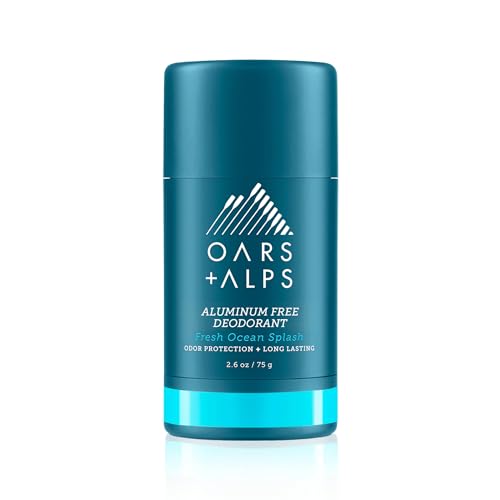
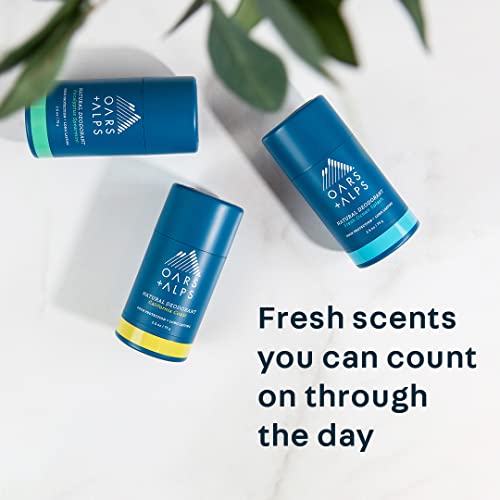
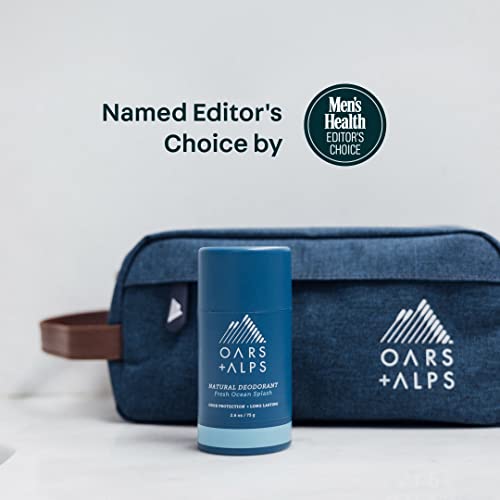
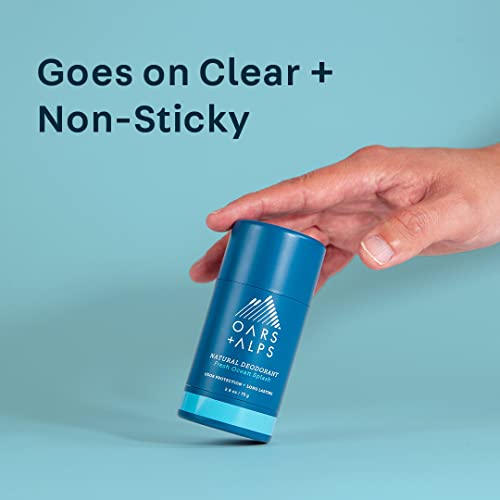
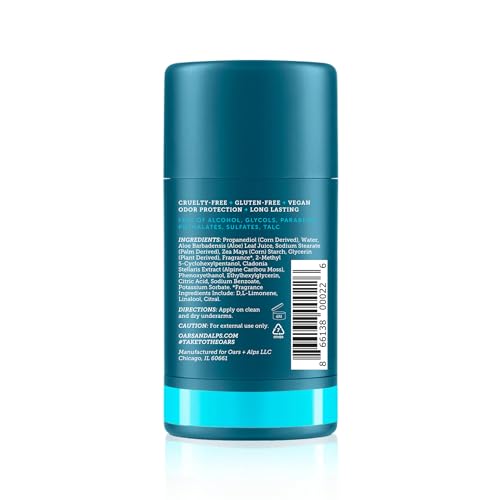
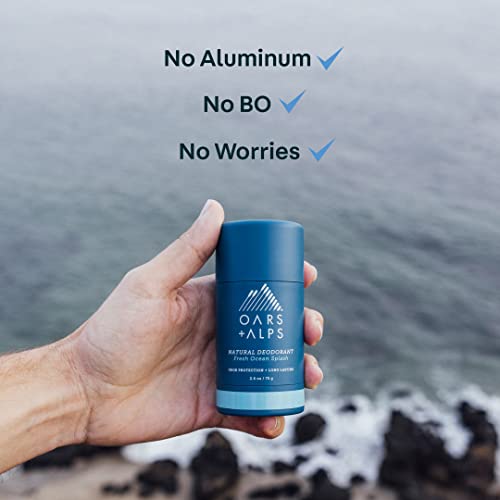

Oars + Alps Deodorant - Powerful Odor Protection, Vegan Ingredients, Fresh Ocean Splash - 2.6 Oz


Fragrance
High RiskFragrance refers to a mixture of aromatic compounds used in products to provide scent. It is commonly listed as 'fragrance' or 'parfum' on product labels and can serve various functions, including enhancing user experience and masking undesirable odors.
Sustai Insights
Fragrance offers functional benefits by improving product appeal; however, it poses significant health risks, notably a high likelihood of causing allergies and allergic contact dermatitis. Environmental risks include potential pollution and endocrine disruption, though its overall carcinogenicity is low. Regulatory bodies have noted concerns regarding its use, leading to a high-risk classification. Safe usage practices should be observed, and alternatives such as natural essential oils are recommended for those sensitive to synthetic fragrances.
Benzyl Salicylate
High RiskBenzyl salicylate is an ester of benzyl alcohol and salicylic acid, commonly used in personal care products as a fragrance component and UV filter. It is known for its ability to enhance product stability and provide a pleasant scent.
Sustai Insights
Benzyl salicylate offers functional benefits such as UV protection and fragrance enhancement. However, it is associated with a high allergenic potential and is categorized as a skin irritant, posing significant health risks. Environmental risks include its potential to act as a pollutant. Regulatory authorities have imposed restrictions on its use due to these concerns. Overall, it is assessed as high risk, necessitating caution in usage and consideration of safer alternatives.
Hexyl Cinnamal
High RiskHexyl cinnamal is a naturally occurring and synthetic fragrance ingredient used primarily for its pleasant floral scent. It is commonly found in personal care and cosmetic products, contributing to their aromatic profiles.
Sustai Insights
Hexyl cinnamal provides a desirable fragrance in cosmetic formulations, enhancing product appeal. However, it is associated with a high allergenic potential, posing risks of skin irritation and sensitization. While it is not classified as a carcinogen or reproductive toxin, its use is restricted in certain regions. Overall, the ingredient presents a high risk due to its allergenic properties, necessitating caution in formulations, especially for sensitive populations.
Phenoxyethanol
Medium RiskPhenoxyethanol is a preservative used in cosmetics and personal care products to prevent microbial growth and extend shelf life. It is commonly found in formulations such as lotions, creams, and serums.
Sustai Insights
Phenoxyethanol serves effectively as a preservative, ensuring product stability and safety by inhibiting microbial growth. It is considered to have low health risks regarding carcinogenicity, allergies, and reproductive toxicity. However, moderate use restrictions exist, and regulatory bodies have advised caution in specific applications. Environmental concerns include its potential as a pollutant, although it is not highly bioaccumulative. Overall, the ingredient presents a medium risk level, with safe usage practices recommended and alternative preservatives available for those seeking greener options.
Vegetarian Glycerin
Low RiskVegetarian glycerin, also known as glycerol, is a colorless, odorless, and viscous liquid derived from plant sources. It is primarily used as a humectant, solvent, and emollient in various personal care products, helping to retain moisture and improve texture.
Sustai Insights
Vegetarian glycerin offers functional benefits as an effective humectant, promoting hydration and skin smoothness. It is biodegradable and typically sustainably sourced. Health risks associated with glycerin are low, with no significant concerns for carcinogenicity, allergens, or reproductive toxicity. Environmental risks are minimal, and it is not subject to major regulatory warnings. Overall, the risk level for this ingredient is low, making it a safe choice in formulations. Safe usage practices include ensuring proper concentrations in products, and alternatives such as propylene glycol exist but may have differing properties.
Water
Low RiskWater is a clear, colorless liquid essential for various biological processes. It serves as a solvent in formulations, facilitating the dissolution of other ingredients and enhancing product texture and application. Additionally, water plays a crucial role in hydration and is a key component in many cosmetic and personal care products.
Sustai Insights
Water is an effective solvent and hydrator, contributing to the texture and efficacy of formulations. It is biodegradable and generally regarded as safe, with low concerns regarding carcinogenicity, allergies, and reproductive toxicity. However, excessive water usage can lead to environmental concerns, particularly regarding resource depletion. Regulatory bodies do not impose restrictions on water use in cosmetics. Overall, the risks associated with water are low, making it a safe and essential ingredient.
Zea Mays (Corn) Starch
Low RiskZea mays (corn) starch is a starch obtained from corn kernels, primarily used as a thickening and stabilizing agent in various cosmetic and food products. It serves as a binder and enhances texture, contributing to the overall formulation's consistency and stability.
Sustai Insights
Zea mays (corn) starch offers functional benefits such as acting as a thickening and stabilizing agent, which helps improve product texture. It is sustainably sourced and biodegradable, posing low health risks, including negligible concerns for carcinogenicity and allergies. Environmental risks are minimal, with no significant pollutant potential noted. Regulatory bodies have not issued advisories, indicating a low overall risk level. Safe usage practices involve ensuring appropriate concentrations in formulations. Alternatives include other plant-based starches or thickeners, which may offer similar functional benefits while maintaining sustainability.
Sodium Behenate
Low RiskSodium behenate is a sodium salt of behenic acid, primarily used in cosmetic formulations as an emulsifier and thickening agent. It helps stabilize mixtures of oil and water, enhancing the texture and consistency of products.
Sustai Insights
Sodium behenate offers functional benefits as an effective emulsifier in cosmetic formulations, contributing to product stability and texture. It is considered low risk for health concerns, including carcinogenicity and allergies, and does not pose significant environmental hazards. Regulatory assessments indicate it is generally safe for use, with low restrictions. Safe usage practices are recommended, and while alternatives exist, sodium behenate remains a suitable choice for many formulations, reflecting an overall low-risk profile.
Ethylhexylglycerin
Low RiskEthylhexylglycerin is a glyceryl ether utilized primarily as a skin-conditioning agent and preservative in cosmetic formulations. It enhances the efficacy of preservatives and serves as a humectant, helping to retain moisture in the skin. This ingredient is commonly found in various personal care products.
Sustai Insights
Ethylhexylglycerin offers functional benefits as an effective preservative and skin-conditioning agent, contributing to product longevity and moisture retention. Health risks are generally low, with minor concerns regarding allergic contact dermatitis and irritant potential. Environmentally, it poses minimal risks, not being recognized as a pollutant or bioaccumulative. Regulatory bodies have imposed few restrictions, indicating its safety for use. Overall, its risk level is assessed as low, making it a viable option in cosmetic formulations. For those seeking alternatives, ingredients like propanediol may serve similar functions with potentially lower irritation profiles.
Propanediol
Low RiskPropanediol is a glycol compound commonly used in cosmetic and personal care products as a solvent, humectant, and skin-conditioning agent. It serves to enhance the texture and moisture retention of formulations, contributing to overall product efficacy.
Sustai Insights
Propanediol offers functional benefits such as effective moisture retention and improved product application. It is considered low-risk in terms of health concerns, with minimal associations with carcinogenicity, allergies, or reproductive toxicity. Environmentally, it has low pollutant potential and is not bioaccumulative. Regulatory bodies have not placed restrictions on its use. Despite concerns regarding enhanced skin absorption and potential endocrine disruption, the overall assessment indicates low risk. Safe usage practices should be followed, and alternatives like glycerin or other plant-based humectants can be considered.
Aloe Barbadensis (Aloe Vera) Leaf Extract
Low RiskAloe vera leaf extract is produced from the succulent leaves of the Aloe barbadensis plant. It is commonly used in cosmetic formulations for its moisturizing and soothing properties, making it a popular ingredient in skincare and personal care products.
Sustai Insights
Aloe vera leaf extract offers several functional benefits, including hydration and skin soothing effects, which are well-supported by scientific literature. It is considered to have a low risk for common health concerns such as carcinogenicity, allergies, or reproductive toxicity. Environmentally, it poses minimal risks, with no significant pollutant potential or bioaccumulation reported. Regulatory bodies have not imposed major restrictions, although verified products should not contain certain contaminants. Overall, this ingredient is assessed as low risk, with safe usage practices and the availability of alternative soothing agents if desired.
Vegetarian Glycerin
Low RiskVegetarian glycerin, also known as glycerol, is a colorless, odorless, and viscous liquid derived from plant sources. It is primarily used as a humectant, solvent, and emollient in various personal care products, helping to retain moisture and improve texture.
Sustai Insights
Vegetarian glycerin offers functional benefits as an effective humectant, promoting hydration and skin smoothness. It is biodegradable and typically sustainably sourced. Health risks associated with glycerin are low, with no significant concerns for carcinogenicity, allergens, or reproductive toxicity. Environmental risks are minimal, and it is not subject to major regulatory warnings. Overall, the risk level for this ingredient is low, making it a safe choice in formulations. Safe usage practices include ensuring proper concentrations in products, and alternatives such as propylene glycol exist but may have differing properties.
Water
Low RiskWater is a clear, colorless liquid essential for various biological processes. It serves as a solvent in formulations, facilitating the dissolution of other ingredients and enhancing product texture and application. Additionally, water plays a crucial role in hydration and is a key component in many cosmetic and personal care products.
Sustai Insights
Water is an effective solvent and hydrator, contributing to the texture and efficacy of formulations. It is biodegradable and generally regarded as safe, with low concerns regarding carcinogenicity, allergies, and reproductive toxicity. However, excessive water usage can lead to environmental concerns, particularly regarding resource depletion. Regulatory bodies do not impose restrictions on water use in cosmetics. Overall, the risks associated with water are low, making it a safe and essential ingredient.
Zea Mays (Corn) Starch
Low RiskZea mays (corn) starch is a starch obtained from corn kernels, primarily used as a thickening and stabilizing agent in various cosmetic and food products. It serves as a binder and enhances texture, contributing to the overall formulation's consistency and stability.
Sustai Insights
Zea mays (corn) starch offers functional benefits such as acting as a thickening and stabilizing agent, which helps improve product texture. It is sustainably sourced and biodegradable, posing low health risks, including negligible concerns for carcinogenicity and allergies. Environmental risks are minimal, with no significant pollutant potential noted. Regulatory bodies have not issued advisories, indicating a low overall risk level. Safe usage practices involve ensuring appropriate concentrations in formulations. Alternatives include other plant-based starches or thickeners, which may offer similar functional benefits while maintaining sustainability.
Fragrance
High RiskFragrance refers to a mixture of aromatic compounds used in products to provide scent. It is commonly listed as 'fragrance' or 'parfum' on product labels and can serve various functions, including enhancing user experience and masking undesirable odors.
Sustai Insights
Fragrance offers functional benefits by improving product appeal; however, it poses significant health risks, notably a high likelihood of causing allergies and allergic contact dermatitis. Environmental risks include potential pollution and endocrine disruption, though its overall carcinogenicity is low. Regulatory bodies have noted concerns regarding its use, leading to a high-risk classification. Safe usage practices should be observed, and alternatives such as natural essential oils are recommended for those sensitive to synthetic fragrances.
Sodium Behenate
Low RiskSodium behenate is a sodium salt of behenic acid, primarily used in cosmetic formulations as an emulsifier and thickening agent. It helps stabilize mixtures of oil and water, enhancing the texture and consistency of products.
Sustai Insights
Sodium behenate offers functional benefits as an effective emulsifier in cosmetic formulations, contributing to product stability and texture. It is considered low risk for health concerns, including carcinogenicity and allergies, and does not pose significant environmental hazards. Regulatory assessments indicate it is generally safe for use, with low restrictions. Safe usage practices are recommended, and while alternatives exist, sodium behenate remains a suitable choice for many formulations, reflecting an overall low-risk profile.
Phenoxyethanol
Medium RiskPhenoxyethanol is a preservative used in cosmetics and personal care products to prevent microbial growth and extend shelf life. It is commonly found in formulations such as lotions, creams, and serums.
Sustai Insights
Phenoxyethanol serves effectively as a preservative, ensuring product stability and safety by inhibiting microbial growth. It is considered to have low health risks regarding carcinogenicity, allergies, and reproductive toxicity. However, moderate use restrictions exist, and regulatory bodies have advised caution in specific applications. Environmental concerns include its potential as a pollutant, although it is not highly bioaccumulative. Overall, the ingredient presents a medium risk level, with safe usage practices recommended and alternative preservatives available for those seeking greener options.
Ethylhexylglycerin
Low RiskEthylhexylglycerin is a glyceryl ether utilized primarily as a skin-conditioning agent and preservative in cosmetic formulations. It enhances the efficacy of preservatives and serves as a humectant, helping to retain moisture in the skin. This ingredient is commonly found in various personal care products.
Sustai Insights
Ethylhexylglycerin offers functional benefits as an effective preservative and skin-conditioning agent, contributing to product longevity and moisture retention. Health risks are generally low, with minor concerns regarding allergic contact dermatitis and irritant potential. Environmentally, it poses minimal risks, not being recognized as a pollutant or bioaccumulative. Regulatory bodies have imposed few restrictions, indicating its safety for use. Overall, its risk level is assessed as low, making it a viable option in cosmetic formulations. For those seeking alternatives, ingredients like propanediol may serve similar functions with potentially lower irritation profiles.
Propanediol
Low RiskPropanediol is a glycol compound commonly used in cosmetic and personal care products as a solvent, humectant, and skin-conditioning agent. It serves to enhance the texture and moisture retention of formulations, contributing to overall product efficacy.
Sustai Insights
Propanediol offers functional benefits such as effective moisture retention and improved product application. It is considered low-risk in terms of health concerns, with minimal associations with carcinogenicity, allergies, or reproductive toxicity. Environmentally, it has low pollutant potential and is not bioaccumulative. Regulatory bodies have not placed restrictions on its use. Despite concerns regarding enhanced skin absorption and potential endocrine disruption, the overall assessment indicates low risk. Safe usage practices should be followed, and alternatives like glycerin or other plant-based humectants can be considered.
Benzyl Salicylate
High RiskBenzyl salicylate is an ester of benzyl alcohol and salicylic acid, commonly used in personal care products as a fragrance component and UV filter. It is known for its ability to enhance product stability and provide a pleasant scent.
Sustai Insights
Benzyl salicylate offers functional benefits such as UV protection and fragrance enhancement. However, it is associated with a high allergenic potential and is categorized as a skin irritant, posing significant health risks. Environmental risks include its potential to act as a pollutant. Regulatory authorities have imposed restrictions on its use due to these concerns. Overall, it is assessed as high risk, necessitating caution in usage and consideration of safer alternatives.
Aloe Barbadensis (Aloe Vera) Leaf Extract
Low RiskAloe vera leaf extract is produced from the succulent leaves of the Aloe barbadensis plant. It is commonly used in cosmetic formulations for its moisturizing and soothing properties, making it a popular ingredient in skincare and personal care products.
Sustai Insights
Aloe vera leaf extract offers several functional benefits, including hydration and skin soothing effects, which are well-supported by scientific literature. It is considered to have a low risk for common health concerns such as carcinogenicity, allergies, or reproductive toxicity. Environmentally, it poses minimal risks, with no significant pollutant potential or bioaccumulation reported. Regulatory bodies have not imposed major restrictions, although verified products should not contain certain contaminants. Overall, this ingredient is assessed as low risk, with safe usage practices and the availability of alternative soothing agents if desired.
Hexyl Cinnamal
High RiskHexyl cinnamal is a naturally occurring and synthetic fragrance ingredient used primarily for its pleasant floral scent. It is commonly found in personal care and cosmetic products, contributing to their aromatic profiles.
Sustai Insights
Hexyl cinnamal provides a desirable fragrance in cosmetic formulations, enhancing product appeal. However, it is associated with a high allergenic potential, posing risks of skin irritation and sensitization. While it is not classified as a carcinogen or reproductive toxin, its use is restricted in certain regions. Overall, the ingredient presents a high risk due to its allergenic properties, necessitating caution in formulations, especially for sensitive populations.
Experience the effective protection of Oars + Alps Aluminum Free Deodorant, formulated with clean, vegan ingredients for both men and women. This travel-size deodorant boasts a Fresh Ocean Splash scent, combining Cedarwood, Lime, and Fresh Greens for a refreshing aroma.
- Powerful Odor Prevention: This dermatologist-tested formula ensures long-lasting freshness without compromising on safety.
- Clear Application: Unlike many deodorants, this goes on clear, preventing white marks or pit stains on your clothes for a cleaner look.
- Premium Ingredients: Crafted with care, it’s free from aluminum, alcohol, parabens, and phthalates, making it gentle on sensitive skin.
- Unique Scent: The Fresh Ocean Splash scent is light and invigorating, leaving you feeling cool and sophisticated throughout the day.
- Skin-Friendly: Free from baking soda, this deodorant minimizes irritation, ensuring comfort for all-day wear.
Make a conscious choice for your body and the planet with Oars + Alps, where quality meets sustainability.
Subscribe & Save with Sustai
- Best Price Guarantee: Always enjoy the lowest prices on sustainable home essentials.
- No Surprises: We’ll notify you before shipping. No hidden fees, ever.
- You’re in Charge: Change, pause, or cancel your subscription anytime with ease.
- Eco-Friendly Deliveries: Our grouped shipments mean less packaging and lower emissions.
Join us on a sustainable journey. Special offers for a limited time! Prices and promotions may change.
Recommended Products
Experience the effective protection of Oars + Alps Aluminum Free Deodorant, formulated with clean, vegan ingredients for both men and women. This travel-size deodorant boasts a Fresh Ocean Splash scent, combining Cedarwood, Lime, and Fresh Greens for a refreshing aroma.
- Powerful Odor Prevention: This dermatologist-tested formula ensures long-lasting freshness without compromising on safety.
- Clear Application: Unlike many deodorants, this goes on clear, preventing white marks or pit stains on your clothes for a cleaner look.
- Premium Ingredients: Crafted with care, it’s free from aluminum, alcohol, parabens, and phthalates, making it gentle on sensitive skin.
- Unique Scent: The Fresh Ocean Splash scent is light and invigorating, leaving you feeling cool and sophisticated throughout the day.
- Skin-Friendly: Free from baking soda, this deodorant minimizes irritation, ensuring comfort for all-day wear.
Make a conscious choice for your body and the planet with Oars + Alps, where quality meets sustainability.

You can have at most 2 Sustainable Steals products in your cart
Customer Reviews
Customers’ View
Customers generally appreciate the Oars + Alps Aluminum-Free Deodorant for its pleasant, light scent and effective odor control. Many users highlight the product's stain resistance, noting that it does not leave marks on clothing and goes on smoothly. The skin-friendly formula, which is vegan and free from aluminum and baking soda, resonates well with health-conscious consumers. However, some customers report experiences of skin irritation, including rashes and burning sensations, which may be a concern for those with sensitive skin. Additionally, opinions on the deodorant's longevity vary, with some users finding it effective throughout the day while others feel it requires reapplication. Overall, customers value the product's natural ingredients and effectiveness in odor prevention, aligning with their sustainable lifestyle choices.
AI-generated from the text of customer reviewsThis product is rated 4.1 of 5.0 stars.
It has received 22 reviews.





